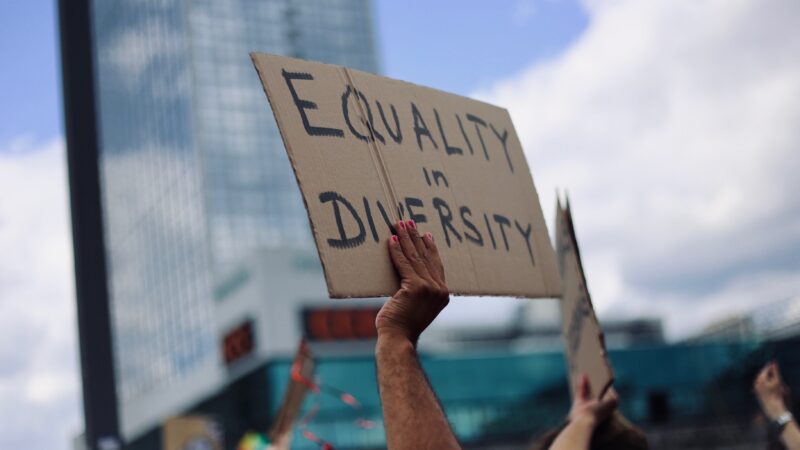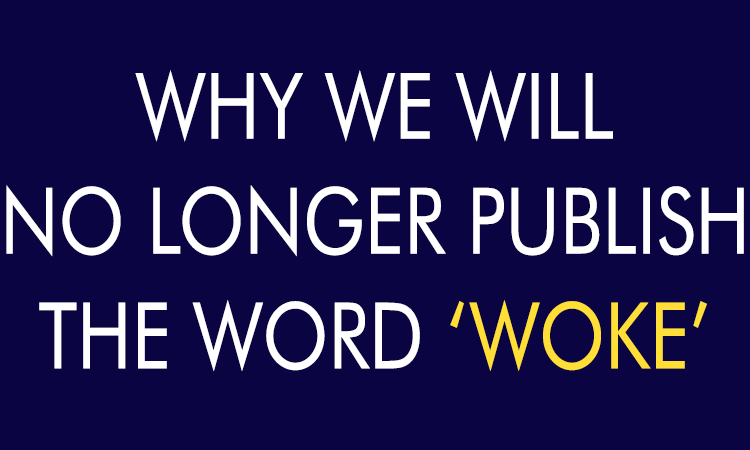Identity Politics in the Conservative Party
The leadership election has brought about a wave of Conservatives flexing about how diverse and inclusive the Conservative Party is compared to Labour. Among the first days of the elections, there were endless tweets about how the party has the most diverse leadership election in history.
Andrew Bowie, Conservative MP for West Aberdeenshire and Kincardine tweeted that the reasons why he’s proud to be a Conservative MP include “first trans MP” and “the most diverse cabinet in history.”
The online publication Spiked, released an article on how “The Tory leadership race is the most diverse in history. And this has sent the left into meltdown.”
The founder of Tories for Equality tweeted: “I feel proud that British children today, whatever their race, can look at the talented & diverse slate of conservative leadership candidates & think “I could do that”. I didn’t have that growing up under the U.K. Labour government. Proud of my country & proud of my party.”
This is a new attempt to call the left the real racists while celebrating how greatly diverse the Conservatives are. It appears that too many Conservative party members truly believe that to defeat the libs you must become one. Die a hero or live long enough to see yourself become the villain.
This is not to say that a candidates’ ethnicity and gender may be a key aspect of their campaign. After all, there’s merit to having a story of being an outsider or overcoming a struggle related to their identity. However, these MPs have been completely tokenised by those on the right. It doesn’t matter what they’ve done to these identity obsessed Conservatives, as long as their identity is good optics. And despite the attempted revision of history, this is not new for the Conservative Party.
The Conservatives have ridiculed the Labour Party’s anti meritocratic all female shortlists. However, it appears that the Conservatives are also guilty of identity politics hiring…
Under Cameron’s government, there was an active attempt to make the government less pale, male and stale. From David Cameron’s own account in a recent article, he wrote for The Times:
“I immediately froze the selection of Conservative candidates. I said that from our broader candidates’ list we would draw up a priority list, of which half would be female and a large proportion would be from black and minority ethnic backgrounds. Associations in winnable seats would have to choose from this “A-list”, and they would be encouraged to select candidates through “open primaries” that were open to non-party members.”
Cameron admits that the call for positive discrimination was because “this wasn’t happening naturally”. Despite denying this was an act of positive discrimination, and instead dubbing it as “positive action”, Cameron states that “We headhunted great candidates from ethnic minorities and pushed them forwards.”
Despite Cameron’s doublethink to frame choosing candidates for the sake of their ethnicity as meritocracy exemplifies how the party has been poisoned by Blairism. How can the Conservative Party differentiate themselves away from Labour’s positive discrimination when it can be seen they acting in a similar nature?
Of course, this isn’t to state that the party leadership candidates aren’t deserving. The strongest, popular candidates are those from minority ethnic identities and/or women. It would be doing them an injustice to only celebrate them for their identity rather than what they believe. While the Westminster bunch pander to identity politics, it is clear that the party membership is focused on what a candidate wants advocates for more than the colour of their skin or what is between their legs.






Five Truths from Dostoevsky’s The Devils
Whenever I scroll through the news on Twitter or listen to talk radio, I like to play a game called “Dostoevsky called it.” As one can guess, it consists of identifying events or trends that correspond with those in Feodor Dostoevsky’s novels and letters. Because Dostoevsky devoted so much ink to warning about the motives and effects of atheist-utilitarian socialism from the radical left, the game often points to his most direct attack on those ideas: The Devils.
Published between 1871 and 1872 and written in response to the Nechaev affair, where an underground group of socialist-atheist radicals, planning to ultimately overthrow the Tsarist government through propaganda, terrorism, and assassination, murdered a former comrade who had left their secret society, The Devils (Бесы; also translated as Demons or The Possessed) is Feodor Dostoevsky’s most explicit expose of and polemic against the revolutionary nihilism growing in late nineteenth-century Russia. Although, due to his own participation in a socialist plot aimed at educating and ultimately liberating the serfs, he often gave the benefit of the doubt to the moral idealism of the younger generation of radicals—assuming their hearts, if not their methods, were in the right place—in The Devils he nonetheless skewers the radical ideology and his generation and the next’s culpability for it.
While his main focus is on the characters’ psychologies and their symbolic significance, Dostoevsky nonetheless lays out many of the ideas populating late-nineteenth-century Russia, displaying a thorough understanding of them, their holders’ true motives (which, like those of that other ideological murderer Raskalnikov, are rarely the same as those consciously stated by their loudest advocates), and what would be the results if they were not checked. In several places, Dostoevsky unfortunately calls it right, and The Devils at times reads as a preview of the following fifty years in Russia, as well as of the modes and methods of radicalism in later places and times.
It would be too great a task to cite, here, all the places and times where Dostoevsky’s visions were confirmed; at best, after laying out a few of the many truths in The Devils, I can only note basic parallels with later events and trends in Russia and elsewhere—and let my readers draw their own additional parallels. Nonetheless, here are five truths from Dostoevsky’s The Devils:
1: The superfluity of the preceding liberal generation to progressive radicals.
The Devils is structured around the relationship between the older and younger generations of the mid-1800s. The book opens with an introduction of Stepan Trofimovich Verkhovensky, father to the later introduced radical Peter Stepanovich. A Westernized liberal from the 1840s generation, Stepan Trofimovich represents the upper-class intelligentsia that first sought to enlighten the supposedly backwards Russia through atheistic socialism (a redundancy in Dostoevsky).
However, despite his previously elevated status as a liberal and lecturer, by the time of The Devils Stepan Trofimovich—and, with him, the 1840s liberals who expected to be honored for opening the door to progress—has become superfluous. This is highlighted when his son returns to the province and does not honor his father with figurative laurels (when such a symbol is later employed literally it is in satirical mock).
Though never the direct butt of Dostoevsky’s satire, Stepan Trofimovich cannot (or refuses) to understand that his son’s nihilism is not a distortion of his own generation’s hopes but is the logical, inevitable product of them. The older man’s refusal to admit his ideological progeny in his literal progeny’s beliefs, of course, enables Peter Stepanovich to mock him further, even while he continues to avail himself of the benefits of his father’s erstwhile status in society. This “liberal naivete enabling radical nihilism” schema can also be seen in the governor’s wife, Yulia Mikhailovna von Lembke, who believes that she can heroically redirect the passions of the youth to more socially beneficial, less radical, pursuits but only ends up enabling them to take over her literary fete to ridicule traditional society and distract the local worthies while agents set parts of the local town ablaze. Stepan Trofimovich, Yulia Mikhailovna, and others show that, despite the liberal generation’s supposed love for Russia, they were unable to brake the pendulum they sent swinging towards leftism.
The same pattern of liberals being ignored or discarded by the progressives they birthed can be seen in later years in Russia and other nations. While it would historically be two generations between Belinsky and Lenin (who was born within months of Dostoevsky’s starting to write The Devils), after the 1917 Revolution, Soviet Russia went through several cycles of executing or imprisoning previous generations who, despite supporting the Revolution, were unfortunately too close to the previous era to be trusted by new, socialistically purer generations.
In a more recent UK, Dostoevsky’s schema can also be seen in the Boomer-led Labour of the ‘90s and ‘00s UK paving the way for the radical, arguably anti-British progressivism of the 2010s and ‘20s (which, granted, sports its share of hip Boomers). In America, it can be seen in the soft divide in congressional Democrats between 20th-century liberals like Nancy Pelosi and Chuck Schumer and “the squad” comprised of Alexandria Ocasio-Cortez, Ilhan Omar, and others who have actively tried (and arguably succeeded) in pushing the nation’s discourse in a left progressive direction.
2: Ideologies as active, distorting forces rather than merely passive beliefs.
“I’ve never understood anything about your theory…” Peter Stepanovich tells the serene Aleksei Nilych Kirillov later in the book, “I also know you haven’t swallowed the idea—the idea’s swallowed you…” The idea he is referring to is Kirillov’s belief that by committing suicide not from despair or passion but by rational, egotistic intention, he can rid mankind of the fear of death (personified in the figure of God) and become the Christ of the new utilitarian atheism (really, Dostoevsky intends us to understand, not without pity for Kirillov, an antichrist thereof). The topic of suicide—rising in Russia at the time of the book’s writing and a result, Dostoevsky believed, of the weakening of social institutions and national morality by the subversive nihilism then spreading—is a motif through the book. Countering Chernyshevsky’s romanticized revolutionary Rakhmetov from What is to Be Done?, Kirillov is Dostoevsky’s depiction of the atheist rational egotism of the time taken to its fullest psychological extent. Like others he had and would later write (Raskalnikov, Ivan Karamazov), Kirillov is driven mad by an idea that “swallows” him in monomania and which he has admitted to being obsessed with—the idea of a world without God.
Though Dostoevsky considered it the central issue of his day (which still torments Western culture), my focus here is not on Kirillov’s idea, itself, but on his relation to it. Countering the Western Enlightenment conceit that ideas are mere tools to be rationally picked up and put down at will, Dostoevsky shows through Kirillov that ideas and ideology (ideas put in the place of religion) are active things that can overwhelm both conscious and unconscious mind. Indeed, the novel’s title and Epigraph—the story of Legion and the swine from Luke 8—already suggests this; for Dostoevsky, there is little difference between the demons that possessed the pigs and the ideas that drive characters like Kirillov to madness.
Of course, a realist-materialist reading of Kirillov’s end (I won’t spoil it, though it arguably undercuts his serenity throughout the book) and the later Ivan Karamazov’s encounter with a personified devil would contend that there was nothing literally demonic to the manifestations, but for Dostoevsky that matters little; for him, whose focus is always on how the individual lives and experiences life, being possessed by an ideology one cannot let go of and being in the grasp of literal demons is nearly synonymous—indeed, the former may be the modern manifestation of the latter, with the same results. In his work, such things almost always accompany a lowering of one’s humanity into the beastial.
The problem with ideology, Dostoevsky had discovered in Siberia, was in their limited conception of man. By cutting off all upper transcendent values as either religious superstition or upper class decadence, the new utilitarian atheism had removed an essential part of what it meant to be human. At best, humans were animals and could hope for no more than thus, and all higher aspirations were to be lowered to achieving present social goals of food, housing, and sex—which Dostoevsky saw, themselves, as impossible to effectively achieve without the Orthodox Church’s prescriptions for how to deal with suffering and a belief in afterlife. Of the lack of higher impressions that give life meaning, Dostoevsky saw two possible results: ever-increasingly perverse acts of the flesh, and ever-increasingly solipsistic devotion to a cause—both being grounded in and expressions not of liberation or selflessness, but of the deepest egotism (which was a frankly stated element of the times’ ideologies).
From this view, Dostoevsky would have seen today’s growing efforts to legitimate into the mainstream things like polyamory, abortion, and public displays of sexuality and increasingly aggressive advocacy by groups like Extinction Rebellion or NOW (he predicted both movements in his other writing) as both being attempts to supply the same religious impulse—which, due to their being cut off by their premises from the transcendent metaphysic required by the human creature and supplied by Christianity, &c, is a doomed attempt.
3: Seemingly virtuous revolution motivated by and covering for private vices.
By the time he wrote The Devils Dostoevsky had seen both inside and outside of the radical movement; he had also depicted in Notes from Underground and Crime and Punishment characters who discover, to their angst and horror, that their actions were not motivated by humanitarianism, but by envy, cravenness, and the subsequent desire for self-aggrandizement. The Devils features the same depth of psychology beneath the main characters’ stated ideas and goals, and the book often shows how said ideas cannot work when applied to real people and real life.
As the chronicle unfolds, characters often speak of the petty vices that undermine the purity of the revolutionaries’ stated virtues and goals. “Why is it,” the narrator recounts Stepan Trofimovich once asking him, “all these desperate socialists and communists are also so incredibly miserly, acquisitive, and proprietorial? In fact, the more socialist someone is…the stronger his proprietorial instinct.” So much for those who seek to abolish property; one can guess to whom they wish to redistribute it! The revolutionary-turned-conservative Ivan Shatov later continues the motif, digging deeper into the radicals’ motives: “They’d be the first to be terribly unhappy if somehow Russia were suddenly transformed, even according to their own ideas, and if it were suddenly to become immeasurably rich and happy. Then they’d have no one to hate, no one to despise, no one to mock! It’s all an enormous, animal hatred for Russia that’s eaten into their system.”
Leftists might accuse Dostoevsky of merely wishing to make the radicals look bad with such an evaluation; however, as addressed by Joseph Frank in his chapter on the topic in Dostoevsky: The Miraculous Years, 1865-1871, the “bad for thee, fine for me” mentality of The Devils’s radicals (if their ideology doesn’t completely blind them to such inconsistency in the first place) was straight from the playbook of men like Nechaev: the Catechism of a Revolutionary. Far from trying to evade contradictory behavior, such a work, and other later analogues (Marcuse’s “Repressive Tolerance”; Alinsky’s Rules for Radicals) advocate being inconsistent and slippery with one’s principles for the sake of the revolution. Indeed, contradicting the rules one was trying to impose on others was and is seen not as an inconsistency but as a special privilege—of which several examples can be found, from upper party opulence in the USSR to modern champagne socialists who attend a $35,000-per-seat Met Gala while advocating taxing the rich.
4: Social chaos and purges as necessary and inevitable in achieving and maintaining utopia.
Perhaps the single most prophetic scene in The Devils occurs in the already mentioned chapter “‘Our Group’ Meets,” which depicts the various local radicals meeting under cover of a birthday party. A cacophony of competing voices and priorities, the scene’s humorous mix of inept, self-serving idealists is made grotesque by the visions they advocate. Most elaborate of the speakers is Shigalyov, whose utopian scheme for the revolution was insightful enough that Boris Pasternak and Alexander Solzhenitsyn both referred to the Russian government’s post-October Revolution policies and methods as “Shigalevism.”
While Shigalyov’s whole speech (and Peter Stepanovich’s commentary) is worth reading as a prophecy of what would happen less than fifty years after the book, here are some notable excerpts:
“Beginning with the idea of unlimited freedom, I end with unlimited despotism…One-tenth will receive personal freedom and unlimited power over the other nine-tenths. The latter must forfeit their individuality and become as it were a herd [through re-education of entire generations]; through boundless obedience, they will attain, by a series of rebirths, a state of primeval innocence, although they’ll still have to work…What I’m proposing is not disgusting; it’s paradise, paradise on earth—there can be none other on earth.”
A direct goal of the purges in Soviet Russia, and of the alienation of children from their parents, was to create a new, purely socialist generation unburdened by the prejudices of previous or outside systems.
“[We’ve] been urged to close ranks and even form groups for the sole purposed of bringing about total destruction, on the pretext that however much you try to cure the world, you won’t be able to do so entirely, but if you take radical steps and cut off one hundred million heads, thus easing the burden, it’ll be much easier to leap over the ditch. It’s a splendid idea…”
While hundred million murders may seem like hyperbole in the scene’s darkly comic context, in the end it was an accurate prediction of what communism would accomplish if put into systemic practice; however, we should also not miss the stated method of destabilizing society via conspiratorial groups aimed not at aid but at acceleration—a method used in early 20th-century Russia and employed by modern radical groups like Antifa.
“It would take at least fifty years, well, thirty, to complete such a slaughter—inasmuch as people aren’t sheep, you know, and they won’t submit willingly.”
Besides the time element, the identifying of the individual human’s desire for life and autonomy as a lamentable but surmountable impediment to revolution—rather than a damning judgment of the radicals’ inability to make any humanitarian claims—is chilling.
“[Shigalyov] has a system for spying. Every member of the society spies on every other one and is obliged to inform. Everyone belongs to all the others and the others belong to each one. They’re all slaves and equal in their slavery.”
A corrollary to the section above on freedom-through-slavery, this part accurately identifies the system of paranoid watchfulness in the first half of the USSR, as well as the system currently in place in the DPRK, among other places.
“The one thing the world needs is obedience. The desire for education is an aristocratic idea. As soon as a man experiences love or has a family, he wants private property. We’ll destroy that want: we’ll unleash drunkenness, slander, denunciantion; we’ll unleash unheard-of corruption… [Crime] is no longer insanity, but some kind of common sense, almost an obligation, at least a noble protest.”
Anti-traditional-family advocacy and the flipping of the criminal-innocent dichotomy as a means of destabilizing the status quo all took place in the early years of the Soviet Union. Unfortunately, they are all too familiar today in the West, whether we’re talking about the current argument in the US that children’s education belongs to the community (i.e. teachers, public unions, and the government) to the exclusion of parents, or the argument heard at several points in the 2020 that crimes and rioting committed during protests were an excusable, even “noble,” form of making one’s voice heard (while nicking a TV in the process!).
More recently and ongoing here in California (often uncannily parallel to the UK in certain policy impulses), our current District Attorney George Gascon, in an attempt to redefine the criminal-victim mentality in the state, has implemented policies that benefit criminals over victims by relaxing the definitions and sentences of certain crimes and refusing to try teenagers who commit felonies as adults (among other things); as many expected would happen, crime has risen in the state, with the Los Angeles PD recently advising residents to avoid wearing jewelry in public—which, to this resident, sounds oddly close to blaming the victim for wearing a short skirt by another name, and is certainly a symptom and example of anarcho-tyranny.
To nineteenth-century readers not as versed as Dostoevsky in the literature and ideas behind the Nechaev affair (which was publicly seen as merely a murder among friends, without the ideological significance Dostoevsky gave it), this section of The Devils would have seemed a comic exaggeration. However, to post-20th-century readers it stands, like a clarion pointing forward to the events later confirmed by Solzhenitsyn, as a dire warning not to forget the truth in the satire and not to dismiss the foolishly hyperbolic as impotent. Even in isolated forms, the ideas promoted by Shigalyev are real, and when applied they have been, as Dostoevsky predicted, disastrous.
5: Socialism not as humanitarian reason, but as religious poetry; revolution as primarily aesthetic, not economic.
An amalgam of, among other members of the 1840s generation, the father of Russian socialism Alexander Herzen, Stepan Trofimovich is, by the time of the 1860s setting of The Devils, an inveterate poet. This reflects Dostoevsky’s evaluation of his old theorist friend, whom he nonetheless cites as the enabler of men like the nihilist terrorist Nechaev, despite Herzen’s claims that the terrorist had bastardized his ideas (see truth number 1, above).
The brilliantly mixed critique of and homage to Dostoevsky’s own generation that is Stepan Trofimovich presents one of the book’s main motifs about the nihilist generation: that they are not pursuing a philosophically rational system of humanitarian goals, but a romantically poetic pseudo-religion. “They’re all bewitched,” cries Stepan Trofimovich about his son, “not by realism, but by the emotional and idealistic aspects of socialism, so to speak, by its religious overtones, its poetry.” Later, at the aforementioned pivotal meeting scene, Peter Stepanovich shows he is completely conscious of this fact—and willing to use it to his advantage. “What’s happening here is the replacement of the old religion by a new one; that’s why so many soldiers are needed—it’s a large undertaking.” In the next scene, Peter Stepanovich reveals to Stavrogin his desire to use the enchanting nobleman as a figurehead for revolution among the peasantry, intending to call him Ivan the Tsarevich to play off of the Russian folk legend of a messianic Tsar in hiding who will rise to take the throne from the “false” reigning Tsar and right all the world’s wrongs with his combined religious and political power.
Peter Stepanovich, himself, is too frank a nihilist to believe in such narratives; focused as he is on first destroying everything rather than wasting time pontificating about what to do afterwards, he even treats Shigalyov’s utopian visions with contempt. However, the rest of the radicals in the book are not so clear-sighted about the nature of their beliefs. Multiple times in the book, susceptibility to radical socialism is said to inhere not in reason but in sentimentality; showing Dostoevsky’s moderation even on a topic of which he was so passionately against, this critique often focuses on younger men and women’s genuine desire to good—which ironically makes them, like the naive and forthright Ensign Erkel, susceptible to committing the worst crimes with a straight, morally self-confident face.
It is this susceptibility to the art of revolution that causes Peter Stepanovich to be so sanguine about others’ romanticism, despite its falling short of his own nihilism. His intention to use others’ art for his own advantage can be seen most clearly in his hijacking of Yulia Mikhailovna’s literary fete to use it, through his cronies, as a screed against the social order and to mock artistic tradition. His doing so is just a follow-through of an earlier statement to Stavrogin that “Those with higher abilities…have always done more harm than good; they’ll either be banished or executed. Cicero’s tongue will be cut out, Copernicus’s eyes will be gouged out, Shakespeare will be stoned…it’s a fine idea to level mountains—there’s nothing ridiculous in that…we’ll suffocate every genius in its infancy.”
Against his son’s leveling of mountains, Stepan Trofimovich, to his infinite credit and speaking with his author’s mouth, declares, with the lone voice of tradition amidst the climactic fete, that “Shakespeare and Raphael are more important than the emancipation of the serfs…than nationalism…than socialism…than the younger generation…than chemistry, almost more important than humanity, because they are the fruit, the genuine fruit of humanity, and perhaps the most important fruit there is!” In this contrast between the Verkhovenskys, it is not different views on economics but on art—on Shakespeare, among others—that that lie at the heart of revolution, with the revolutionaries opposing the English Poet more viscerally than any other figure. This reflects Dostoevsky’s understanding that the monumental cultural shift of the 1800s was not primarily scientific but aesthetic (a topic too large to address here). Suffice it to say, the central conflict of The Devils is not between capitalists and socialists (the book rarely touches on economic issues, apart from their being used as propaganda—that is, aesthetically), nor between Orthodox and atheists (though Dostoevsky certainly saw that as the fundamental alternative at play), but between the 1840s late Romantics and the new Naturalist-Realists.
The prophetic nature of this aesthetic aspect of The Devils has many later confirmations, such as the 20th century’s growth of state propaganda, especially in socialistic states like Nazi Germany or the USSR, though also in the West (Western postmodernism would eventually make all art as interpretable as propaganda). Furthermore, the Stalinist cult of personality seems a direct carry over of Peter Stepanovich’s intended desire to form just such a pseudo-religious cult out of Nikolai Vsevolodovich.
Having written a novel on the threat posed to Shakespeare by the newest generation of the radical left (before reading of Verkhovensky’s desire to stone Shakespeare—imagine my surprise to find that Dostoevsky had called even the events in my own novel!), I hold this particular topic close to my heart. Indeed, I believe we are still in the Romantic-Realist crossroads, and in dire need of backtracking to take the other path that would prefer, to paraphrase Stepan Trofimovich, the beautiful and ennobling Shakespeare and Raphael over the socially useful pair of boots and petroleum. Like Stepan Trofimovich, I believe comforts and technical advancements like the latter could not have come about were it not for the culture of the former—and that they would lose their value were their relative importance confused to the detriment of that which is higher.
Conclusion
There are, of course, many other truths in The Devils that have borne out (the infighting of radical advocacy groups competing for prominence, radicalism as a result of upper-class boredom and idleness, revolution’s being affected not by a majority but a loud minority willing to transgress, self-important administrators and bureaucrats as enablers and legitimators of radicals…). While the increasingly chaotic narrative (meant to mimic the setting’s growing unrest) is not Dostoevsky’s most approachable work, The Devils is certainly one of his best, and it fulfills his intended purpose of showing, like Tolstoy had done a few years before in War and Peace, a full picture of Russian society.
However, while Tolstoy’s work looked backward to a Russia that, from Dostoevsky’s view, had been played out, The Devils was written to look forward, and, more often for ill than good, it has been right in its predictions. Not for nothing did Albert Camus, who would later adapt The Devils for the stage, say on hearing about the Stalinist purges in Soviet Russia that “The real 19th-century prophet was Dostoevsky, not Karl Marx.”
Image Credit